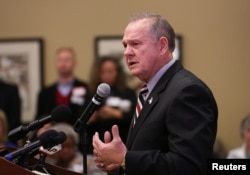Senate Republicans openly discussed expelling Alabama Senate candidate Roy Moore if he win next month’s special election after a woman accused the Republican hopeful of sexually assaulting her when she was 16.
Beverly Young Nelson cried at a New York news conference as she alleged that Moore assaulted her in his car in the late 1970s when she was a student working at a restaurant that he frequented in Gadsden, Alabama. She accused Moore of groping her, touching her breasts and pushing her head toward his crotch.
Four other women accused Moore of sexual misconduct when they were teenagers in an article published last week by the Washington Post.
Moore has denied the allegations as a “witch hunt” and promised to “pursue all legal options against these false claims.”
Aghast at the prospect of an accused sex offender possibly joining the Senate, the chairman of the National Republican Senatorial Committee, Cory Gardner of Colorado, issued a statement calling Moore “unfit to serve in the United States Senate.”
“If he refuses to withdraw and wins, the Senate should vote to expel him, because he does not meet the ethical and moral requirements of the United States Senate,” Gardner said.
Many other Republicans expressed hope expulsion would not be necessary.
“I think he should step aside,” Senate Majority Leader Mitch McConnell said in his home state of Kentucky.
Moore “would be doing himself, the state, the GOP, and the country a service by stepping aside,” Senator Lindsey Graham of South Carolina tweeted. “If he continues this will not end well for Mr. Moore.”
Democrats concurred.
“I’ve always thought of the Senate as being a place that should be the conscience of the nation,” Senator Patrick Leahy of Vermont told VOA. “This [Moore joining the Senate] is not the conscience we’d want to show the nation.”
“I agree with many of my R[epublican] colleagues. He [Moore] doesn’t belong in the Senate. Period,” tweeted Senator Claire McCaskill, a former Missouri prosecutor.
But Moore, a former Alabama Supreme Court justice and firebrand Christian conservative, has given no indication he is contemplating pulling out. New polling data showed a tightened race between Moore and Democrat Doug Jones in Alabama, traditionally a Republican stronghold.
With just weeks to go before the December 12 special election, Moore’s name would remain on the ballot in Alabama even if he dropped out. Some Senate Republicans have suggested a write-in campaign, possibly for Republican Luther Strange, who was appointed to the Senate seat vacated by Jeff Sessions when he was confirmed as President Donald Trump’s attorney general in February.
But Strange told reporters late Monday a write-in campaign by him is "highly unlikely."
"It's going to really be up to the people of our state to sort this out. Let the facts unfold," Strange told reporters.
A divided Republican vote could boost the chances of a Democratic victory in a state that has not had a Democratic senator since 1997. Should Republicans lose the seat, their slim two-seat Senate majority would be cut in half, further endangering tax cuts and other top Trump agenda items.
Republican Majority Whip John Cornyn issued a statement saying the accusations against Moore “are disturbing and, if true, disqualifying.” Cornyn withdrew his endorsement of Moore but added: “The most appropriate course of action, in my view, is to leave the final judgment in the hands of Alabama voters.”
Speaking with reporters, Cornyn declined to say if he supported expelling Moore should he win the election.
“There hasn’t been an election yet. So it’s hard to expel a senator if he wins an election that hasn’t been held,” Cornyn said.
The U.S. Constitution provides that each house of Congress may “punish its members for disorderly behavior and, with the concurrence of two-thirds [of a body], expel a member.”
Fifteen senators have been expelled in the history of the chamber. Ten were expelled during the American Civil War.
“I’ve looked at the statues involved [for expulsion], and it would take deliberation,” Republican Senator Mike Rounds of South Dakota told reporters. “It’s a decision we would not make until that time [after the election].”






